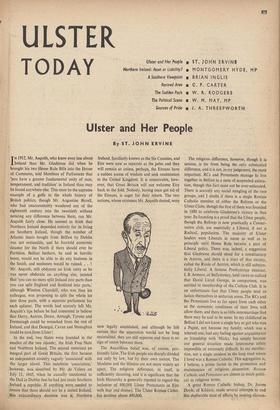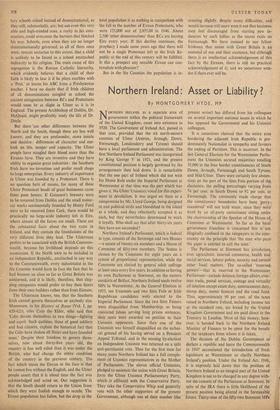TODAY
Ulster and Her People Northern Ireland: Asset or Liability? A Southern Viewpoint Revived Area The Sudden Pack The Political Scene Sources of Pride • ST. JOHN ERVINIE m MONTGOMERY HYDE, MP m BRIAN INGLIS • C. F. CARTER • W. R. RODGERS • W. M. MAY, MP m J. A. THREEPWORTI-1
Ulster and Her People
By ST. JOHN ERVINE TN 1912, Mr. Asquith, who knew even less about 'Ireland than Mr. Gladstone did when he brought his two Home Rule Bills into the House of Commons, told Members of Parliament that `you have a greater fundamental unity of race, temperament, and tradition' in Ireland than may be found anywhere else. This must be the supreme example of a gaffe in the whole history of British politics, though Mr. Augustine Birrell, who had unaccountably wandered out of the eighteenth century into the twentieth without noticing any difference between them, ran Mr. Asquith fairly close. He seemed to think that Northern Ireland depended entirely for its living on Southern Ireland, though the number of Atlantic liners bought from Belfast by Dublin was not noticeable, and he foretold economic disaster for the North if there should ever be Partition. Belfast bankers, he said in horrific tones, would not be able to do any business in the South, and seedsmen would be ruined. . . Mr. Asquith, still obdurate on Irish unity as he was never obdurate on anything else, insisted that 'you can no more split Ireland into parts than you can split England and Scotland into parts,' although Winston Churchill, who was then his colleague, was proposing to split the whole lot into three parts, with • a separate parliament for each splinter. The words had scarcely left Mr. Asquith's lips before he had consented to believe that Derry, Antrim, Down, Armagh, Tyrone and Fermanagh could be wrenched from the rest of Ireland, and that Donegal, Cavan and Monaghan could be torn from Ulster!
In the end, two States were founded in the' smaller of • the two islands : the Irish Free State and Northern. Ireland. The second remained an integral part of Great Britain; the first became an independent country vaguely 'associated' with the larger island. This indefinite 'association,' however, was dissolved by Mr. de Valera on July 11, 1945, when he casually mentioned to the Dail in Dublin that he had just made Southern Ireland a republic. If anything were needed to ensure that there should not be a united Ireland, this extraordinary decision was it. Northern Ireland, familiarly known as the Six Counties, and Eire were now as separate as the poles and they will remain so unless, perhaps, the Eireans have a sudden access of wisdom and seek readmission to the United Kingdom. It is conceivable, how- ever, that Great Britain will not welcome Eire back to the fold. Nobody, having once got rid of the Eireans, is eager for their return. The two nations, whose existence Mr. Asquith denied, were now legally established, and although he felt certain that the separation would not be long maintained, they are still separate and there is no sign of union between them.
The Asquithian belief was, of course, pro- foundly false. The Irish people are sharply divided not only by law, but by their own nature. The Moslems and the Hindus are not more widely set apart. The religious difference, in itself, is sufficiently daunting, and it is significant that the Irish Hierarchy is generally reputed to regard the inclusion of 800,000 Ulster Protestants in Eire with fear and dismay. The Ulster Roman Catho- lics number about 400,000. The religious difference, however, though it is serious, is far from being the only substantial difference, and it is not, in my judgement, the most important. RCs and Protestants manage to live together in Belfast in a state of suspended anima- tion, though this fact must not be over-estimated. There is scarcely any social mingling of the two groups, and I doubt if there is a single Roman Catholic member of either the Reform or the Ulster Clubs, though the first of them was founded in 1880 to celebrate Gladstone's victory in that year. Its founding is a proof that the Ulster people, though the Reform is now practically a Conser- vative club, are essentially a Liberal, . if not a Radical, population. The majority of Ulster leaders were Liberals in name as well as in principle until Home Rule became a part of Liberal policy. There was, indeed, a suggestion that Gladstone should stand for a constituency in Antrim, and there is a tract of that county, called the Route of Antrim, which is still substan- tially Liberal. A famous Presbyterian minister, J. B. Armour, of Ballymoney, held views so radical that David Lloyd George, in comparison, was entitled to membership of the Carlton Club. It is an unfortunate fact that Ulster people tend to isolate themselves in sectarian areas. The.RCs and the Protestants live as far apart from each other as the economic conditions of their lives will allow them, and there is so little intermarriage that there may be said to be none. In my childhood in Belfast I did not know a single boy or girl who was a Papist, not because my family; which was a tolerant one, had any feeling against acquaintance or friendship with Wicks,' but simply because our general situation made intercourse either impossible or extremely difficult. In my recollec- tion, not a single resident in the long road where I lived was a Roman Catholic. This segregation is, I believe, a prime factor in the promotion and maintenance of religious dissension. Roman Catholic and Protestant are almost as much politi- cal as religious terms.
A great Roman Catholic bishop, Dr. James Doyle, of Kildare, made several attempts to end this deplorable state of affairs by making elemen- tary schools mixed instead of denominational, as they still, substantially, are; but not even this very able and high-minded man, a rarity in bis com- munion, could overcome the barriers that blocked his way. Schools, even when they are no longer denominationally governed, as all of them once were, remain sectarian to this extent, that a child is unlikely to be found in a school unattached indirectly to his religion. The main cause of this segregation is the Roman Catholic hierarchy, which evidently believes that a child of their faith is likely to lose it if he plays marbles with a 'Prot.' or learns his ABC from a Presbyterian teacher. I have no doubt that if Irish children of all denominations mingled in school the ancient antagonism between RCs and Protestants would soon be as slight in Ulster as it is in England. The present Archbishop of Dublin, Dr. McQuaid, might profitably study the life of Dr. Doyle.
But there --are other differences between the North and the South, though these are less well known; and they are profounder, more innate and decisive : differences of character and out- look on life, temper and capacity. The Ulster people have mingled their blood more than the Eireans have. They are inventive and they have ability to organise great industries : the Southern Irish have no :invention and prefer small shops to large enterprises. Every industry of importance in Ulster was founded by a Protestant. There is no question here of means, for many of these Ulster Protestant heads of great businesses came from poor homes. If Guinness's brewery were to be removed from Dublin and the small motor- car works sentimentally founded by Henry Ford were to be removed from Cork, there would be practically no large-scale industry left in Eire, where almost all the farms are small. These are the substantial facts about the two races in Ireland, and they contain the foundations of the very different lives they lead. The Ulsterman prefers to be associated with the British Common- wealth, because his livelihood depends on this association. If the North were to be included in an independent Republic, unattached in any way to the Commonwealth, every industrialist in the Six Counties would have to face the fact that he had become an alien so far as Great Britain was concerned, and it is likely, therefore, that ship- ping companies would prefer to buy their liners from their own builders rather than from Eireans. The Ulsterman knows, too, that the Southern Irish cannot govern themselves or anybody else.
Mommsen, in his History of RomelVol.1, pp.
420-421), cites Cato the Elder, who said that 'Celts devote themselves to two things—fighting and esprit. Such qualities, those of good soldiers and bad citizens, explain the historical fact that the Celts have shaken all States' and have founded none.' Despite their freedom to govern them- selves, now about thirty-five years old, the country is less well ruled than it was under the British, who had change the entire condition of the country in the previous century. The fact which stares the Eircan in the face is that he Cannot live without the English, and the Ulster people assert that it is about time the fact was acknowledged and acted on. Our suggestion is that the South should return to the Union from which they were foolish enough to secede. The Eirean population has fallen, but the drop in the total population is as nothing in comparison with the fall in the number of Eirean Protestants, who were 125,000 out of 2,955,00 in 1946. About 2,500 'other denominations' than RCs are leaving Eke every year. If this decline continues, the prophecy I made some years ago that there will not be a single Protestant left in the Irish Re- public at the end of this century will be fulfilled. Is this a prospect any sensible Eirean can con- template with pleasure?
But in the Six Counties the population is in- creasing slightly, despite many difficulties, and would increase still more were it not that business/ men feel discouraged from starting new in- dustries by such follies as the recent raids on Fermanagh. We have insisted to our fellow Irishmen that union with Great Britain is an essential of our and their existence, but although there is an intellectual acknowledgement of this fact by the Eireans, there is still no practical acknowledgement of it; and we sometimes won- der if there ever will be.











































 Previous page
Previous page